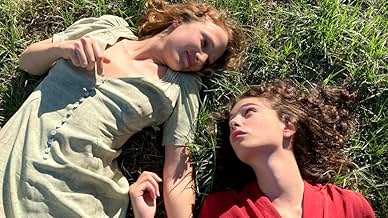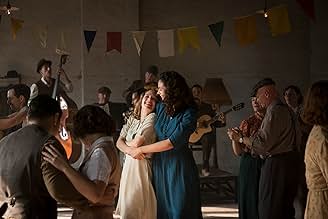IMDb-BEWERTUNG
5,5/10
565
IHRE BEWERTUNG
Die siebzehnjährige Ginia erlebt die Ekstase und den Aufruhr, die den geheimnisvollen Weg zum Erwachsensein kennzeichnen.Die siebzehnjährige Ginia erlebt die Ekstase und den Aufruhr, die den geheimnisvollen Weg zum Erwachsensein kennzeichnen.Die siebzehnjährige Ginia erlebt die Ekstase und den Aufruhr, die den geheimnisvollen Weg zum Erwachsensein kennzeichnen.
- Auszeichnungen
- 3 Nominierungen insgesamt
Fotos
Handlung
WUSSTEST DU SCHON:
- SoundtracksBambina innamorata
Performed by Gabriele Graham Gasco
Ausgewählte Rezension
In two scenes from «La bella estate» sound defines two expressions of love in a beautiful and radical way. In a scene of depersonalized sex, in which the protagonist loses her virginity, the action suddenly becomes silent: no more moans and snorts, only images of naked bodies without connection. In another scene, on a dance floor, realism gives way to daydream, and the tune played by a band turns into a love song, while the lovers' bodies dance in symbolic copulation, oblivious to their surroundings.
These two approaches are used sparingly in a few moments of Laura Luchetti's film, in which ambiguity allows us to reflect on what we see, on the development of events and, above all, on the stylized conclusion marked by the color white, suggesting something beyond what we see on the screen. And if I am not more explicit it is so as not to spoil the film for you.
Based on the novel by Cesare Pavese, set in Turin, one year before the start of World War II, «La bella estate» is the story of Ginia (Vianello), a country girl who develops with great promise in a sewing workshop and helps her brother Severino (Maupas) to pursue university studies and discover his literary talent. But this delicate world, marked by simple pleasures and a measured life, is shaken when they both meet Amelia (Cassel, daughter of Vincent Cassel and Monica Bellucci), a painter's model who, without intending to, separates the siblings and takes Ginia into the world of artists, to ecstasy and unknown emotions.
The 112 minutes pass with the succession of coincidences, joys, transitions, and breakups without fanfare. There are signs of unrest that are not emphasized: fascism is described in a speech by Mussolini, three despotic militiamen who briefly appear or in the black shirts that Severino must wear. It has even been said that the adaptation of Pavese's novel evades contradictions and the visualization of today's gender categories and that the script avoids comments against the proto-fascist and "heteronormative" men of the time - it only observes them, devoting the greatest attention to the story of Ginia and Amelia's friendship.
Happy decision! The film speaks of more beautiful things, of country people, of virtue, innocence, solidarity, love, art, and life in an environment where every arch, stained glass window and canvas point to an aesthetic sense of existence. In this sense, the film is a product of fine workmanship, thanks to the attention paid to the selection of locations, the color cinematography, the art direction, the costumes, the music.
«La bella estate» is one of those films that pervades, one of those that touches us and remains in our memory, one of those that, after the objection we made to the sentimentality of the climax, we recall it the next day and understand crying as an expression of the fragility of Ginia, a beautiful character who was deprived of her naivety -- but not of her goodness -- in her growing process. The ending leaves the page blank, so that we can imagine what happened to the two siblings, the model, the painters, and the mentors, in the midst of war and the whims of Benito Mussolini, Adolf Hitler and all the rest of the bigwigs.
These two approaches are used sparingly in a few moments of Laura Luchetti's film, in which ambiguity allows us to reflect on what we see, on the development of events and, above all, on the stylized conclusion marked by the color white, suggesting something beyond what we see on the screen. And if I am not more explicit it is so as not to spoil the film for you.
Based on the novel by Cesare Pavese, set in Turin, one year before the start of World War II, «La bella estate» is the story of Ginia (Vianello), a country girl who develops with great promise in a sewing workshop and helps her brother Severino (Maupas) to pursue university studies and discover his literary talent. But this delicate world, marked by simple pleasures and a measured life, is shaken when they both meet Amelia (Cassel, daughter of Vincent Cassel and Monica Bellucci), a painter's model who, without intending to, separates the siblings and takes Ginia into the world of artists, to ecstasy and unknown emotions.
The 112 minutes pass with the succession of coincidences, joys, transitions, and breakups without fanfare. There are signs of unrest that are not emphasized: fascism is described in a speech by Mussolini, three despotic militiamen who briefly appear or in the black shirts that Severino must wear. It has even been said that the adaptation of Pavese's novel evades contradictions and the visualization of today's gender categories and that the script avoids comments against the proto-fascist and "heteronormative" men of the time - it only observes them, devoting the greatest attention to the story of Ginia and Amelia's friendship.
Happy decision! The film speaks of more beautiful things, of country people, of virtue, innocence, solidarity, love, art, and life in an environment where every arch, stained glass window and canvas point to an aesthetic sense of existence. In this sense, the film is a product of fine workmanship, thanks to the attention paid to the selection of locations, the color cinematography, the art direction, the costumes, the music.
«La bella estate» is one of those films that pervades, one of those that touches us and remains in our memory, one of those that, after the objection we made to the sentimentality of the climax, we recall it the next day and understand crying as an expression of the fragility of Ginia, a beautiful character who was deprived of her naivety -- but not of her goodness -- in her growing process. The ending leaves the page blank, so that we can imagine what happened to the two siblings, the model, the painters, and the mentors, in the midst of war and the whims of Benito Mussolini, Adolf Hitler and all the rest of the bigwigs.
Top-Auswahl
Melde dich zum Bewerten an und greife auf die Watchlist für personalisierte Empfehlungen zu.
- How long is The Beautiful Summer?Powered by Alexa
Details
Box Office
- Weltweiter Bruttoertrag
- 239.144 $
- Laufzeit1 Stunde 52 Minuten
- Farbe
- Seitenverhältnis
- 2.39 : 1
Zu dieser Seite beitragen
Bearbeitung vorschlagen oder fehlenden Inhalt hinzufügen


![Trailer [OV] ansehen](https://m.media-amazon.com/images/M/MV5BNzI5MWFjNzEtZmUxYy00OTljLTllZWItMmJmMWFjZmIzMGFlXkEyXkFqcGdeQXRyYW5zY29kZS13b3JrZmxvdw@@._V1_QL75_UX500_CR0)

















